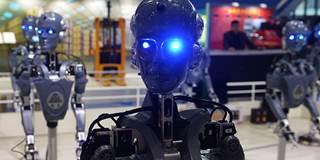Bill Gates thinks that, to ease the social costs implied by automation’s displacement effects, robots should be required to pay taxes. But why make life under capitalism more complicated than it already is, when there is an alternative to a robot tax that is easy to implement and simple to justify?
ATHENS – Ken makes a decent living operating a large harvester on behalf of farmer Luke. Ken’s salary generates income tax and social security payments that help finance government programs for less fortunate members of his community. Alas, Luke is about to replace Ken with Nexus, a robot that can operate the harvester longer, more safely, in any weather, and without lunch breaks, holidays, or sick pay.
Bill Gates thinks that, to ease the inequality and offset the social costs implied by automation’s displacement effects, either Nexus should pay income tax, or Luke should pay a hefty tax for replacing Ken with a robot. And this “robot tax” should be used to finance something like a universal basic income (UBI). Gates’s proposal, one of many variants on the UBI theme, allows us to glimpse fascinating aspects of capitalism and human nature that rich societies have neglected for too long.
The whole point of automation is that, unlike Ken, Nexus will never negotiate a labor contract with Luke. Indeed, it will receive no income. The only way to simulate an income tax on behalf of Nexus is to use Ken’s last annual income as a reference salary and extract from Luke’s revenues income tax and social security charges equivalent to what Ken paid.

ATHENS – Ken makes a decent living operating a large harvester on behalf of farmer Luke. Ken’s salary generates income tax and social security payments that help finance government programs for less fortunate members of his community. Alas, Luke is about to replace Ken with Nexus, a robot that can operate the harvester longer, more safely, in any weather, and without lunch breaks, holidays, or sick pay.
Bill Gates thinks that, to ease the inequality and offset the social costs implied by automation’s displacement effects, either Nexus should pay income tax, or Luke should pay a hefty tax for replacing Ken with a robot. And this “robot tax” should be used to finance something like a universal basic income (UBI). Gates’s proposal, one of many variants on the UBI theme, allows us to glimpse fascinating aspects of capitalism and human nature that rich societies have neglected for too long.
The whole point of automation is that, unlike Ken, Nexus will never negotiate a labor contract with Luke. Indeed, it will receive no income. The only way to simulate an income tax on behalf of Nexus is to use Ken’s last annual income as a reference salary and extract from Luke’s revenues income tax and social security charges equivalent to what Ken paid.